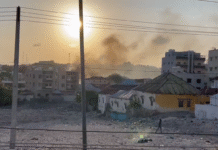The traditional maslaha system of dispute resolution has been blamed for increased rapes because it calls for informal payment instead of trials and imprisonment.
The system has come into focus after many claims that elders sit down to work quietly work out an illegal settlement that bypasses the courts.
For example, a rape victim’s family might be paid in cash and livestock — so they do not prosecute their relative’s rapist. Thus, the family’s ‘honour’ is spared.
Interior CS Fred Matiang has warned chiefs that they will be sacked if found mediating or aiding in covering up rape cases that appear to be increasing in Northeastern.
Many rape cases are swept under the carpet as elders engage in dispute resolution that mostly favours the cuoprits, expecially in sex crimes.
According to elders, any crime or conflict can be resoluted though lengthy discussions and deliberations. These include murder, domestic brawls, rape, inter-clan conflicts and even a threat from a fellow villager.
The culprits may either be let off the hook or forced to pay a reward to the aggrieved parties. The fine imposed onthe culprits is collectively paid by the clan, meaning the offender often pays nothing for his crime.
Elder Dubat Amey from Garissa says the maslaha system ofdispute resolution cannot be washed away altogether since it brings harmony and co-existence. He said it should not be used in serious criminal offences such as rape and defilement. t.
“Rape is irreconcilable and police should pursue such cases to conclusion. These have been uncommon in Northeastern and maslaha should be totally discouraged,” he said.
Activist and child protection officer at Womankind Kenya Hassan Ismail said most cases don’t end up in court due to poverty, corruption and unwillingness by officials in institutions to help ensure justice for defilement and rape cases. Ismael said the future of many girls has been shattered as they live in shame.












